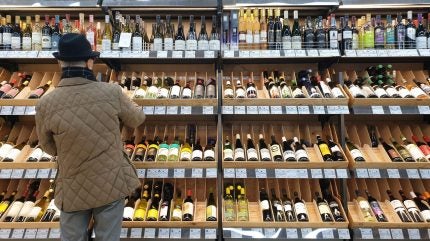
Finding an importer is the biggest challenge facing the majority of wine traders looking to sell in Japan, according to new data.
The findings come from a survey of over 400 global wine exporters and producers, compiled by Geisenheim University on behalf of ProWein.
Establishing a partnership with a Japanese importer was the biggest challenge for 89% of companies planning to export to the country and for 59% already exporting there, the survey shows.
According to the report: “Due to these existing well-established distribution networks in the country, the market can only absorb a limited number of new producers and new wines, say the so far already successful exporters.”
Understanding the Japanese language was the next most significant challenge for businesses exporting and planning to export wine to the country, followed by providing the necessary import documentation and chemical analysis.
Aside from understanding Japanese however, companies also reported a “cultural gap that needs to be overcome” in order to understand how best to win over local importers and consumers alike.
How well do you really know your competitors?
Access the most comprehensive Company Profiles on the market, powered by GlobalData. Save hours of research. Gain competitive edge.

Thank you!
Your download email will arrive shortly
Not ready to buy yet? Download a free sample
We are confident about the unique quality of our Company Profiles. However, we want you to make the most beneficial decision for your business, so we offer a free sample that you can download by submitting the below form
By GlobalDataOther challenges reported included adhering to high-quality standards for integral packaging as well as “learning about the demanded wine styles”.
When it came to sales performance, some 42% of respondents said they expected sales of their products to increase in Japan in 2024, while 46% didn’t expect to see a change year-on-year.
Opportunity for white wine
Japan is being viewed as a potential hub for opportunity when it comes to white wine, with 66% of global exporters predicting white wines to perform well in 2024.
Respondents to the survey included exporters from Italy, Spain, France and the New World wine, as well as Germany, Austria and Portugal.
Breaking down the “absolute values”, 80% of Austrian and German exporters said they thought white wine would see good performance, while 60% of exporters in the other countries agreed.
Close to half of French and Italian exporters also said they believed the sparkling wine segment would see a “higher than average demand” from Japanese consumers this year.
Low- and no-alcohol wines do not appear to be on most wine traders’ radar for Japan just yet, with 14% of companies currently exporting to Japan expecting low-alcohol wines to perform well, and a mere 7% predicting the same for non-alcoholic wines.
A “high-potential” country
Japan's potential as a successful market for wine has also been echoed in recent research from GlobalData, Just Drinks’ parent.
Its latest Opportunities in the Global Wine Sector report labelled Japan as a “high-potential” country, ranking second after the UK for opportunity.
While the country saw a CAGR of negative 2.9% from 2018 to 2023, Japan’s wine market is expected to see this improve to positive 19.5% between 2023 and 2028.
In 2023, it was valued at $1.9bn, with volumes reaching 351.3m litres. By 2028, the market is expected to increase by 15.7% in value to $2.2bn, while volumes are expected to be up 18.1%, at 415m litres.
International wine producers aren’t the only ones facing challenges in the Japanese market. Foreign beer brands also face an array of barriers to trade, especially if they are looking to break into the burgeoning non-alcoholic beer sector, which is already dominated by well-established local names.



